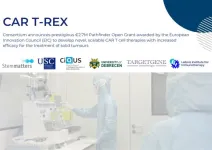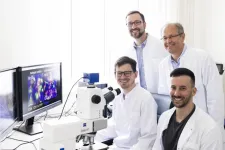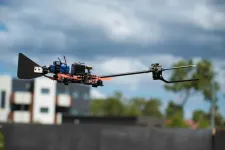(Press-News.org) Edinburgh, UK – 23 June 2023: It could be the shopping trip that saves your life: supermarket trolleys are helping to diagnose atrial fibrillation which can then be treated to prevent disabling or fatal strokes. The research is presented today at ACNAP 2023, a scientific congress of the European Society of Cardiology (ESC).1
“This study shows the potential of taking health checks to the masses without disrupting daily routines,” said study author Professor Ian Jones of Liverpool John Moores University, UK. “Over the course of two months, we identified 39 patients who were unaware that they had atrial fibrillation. That’s 39 people at greater risk of stroke who received a cardiologist appointment.”
More than 40 million people around the world have atrial fibrillation, the most common heart rhythm disorder.2 Atrial fibrillation increases the risk of stroke by five-fold. These strokes are often fatal or disabling. Anticoagulation substantially lowers risk, but many people only discover they have atrial fibrillation after they have a stroke.3 Screening programmes are therefore needed to identify people with the condition so they can receive preventive medication.
The SHOPS-AF study investigated whether embedding electrocardiogram (ECG) sensors into the handles of supermarket trolleys could effectively identify shoppers with atrial fibrillation (see photo).4,5 Ten trolleys had a sensor placed in the handle and were used across four supermarkets with pharmacies in Liverpool during the two month study.
Shoppers were asked to use a modified trolley and hold the handlebar for at least 60 seconds. If the sensor did not detect an irregular heartbeat, it lit up green. These participants had a manual pulse check by a researcher to confirm there was no atrial fibrillation. If an irregular heartbeat was found, the sensor lit up red. The in-store pharmacist then did a manual pulse check and another sensor reading using a standalone bar not attached to a trolley with the participant standing still. The study cardiologist reviewed the ECG recordings of participants with a red light and/or irregular pulse. Participants were informed of the results, which were: 1) no atrial fibrillation; 2) unclear ECG and an invitation to repeat the measurement; or 3) atrial fibrillation confirmed and a cardiologist appointment within two weeks.
A total of 2,155 adults used a shopping trolley. ECG data were available for 220 participants who either had a red light on the sensor and/or an irregular pulse, suggesting atrial fibrillation. After ECG review by the study cardiologist, there was no evidence of atrial fibrillation in 115 participants, 46 recordings were unclear, and atrial fibrillation was diagnosed in 59 participants. The average age of the 59 participants with atrial fibrillation was 74 years and 43% were women. Of those, 20 already knew they had atrial fibrillation and 39 were previously undiagnosed.
To assess the accuracy of screening using this method, the researchers conducted three analyses: 1) excluding all 46 unclear ECGs; 2) assuming all unclear ECGs were atrial fibrillation; and 3) assuming all unclear ECGs were not atrial fibrillation. This showed that the sensor’s sensitivity ranged from 0.70 to 0.93 and specificity ranged from 0.15 to 0.97. This resulted in a positive predictive value of 0.24 to 0.56, meaning that only one-quarter to one-half of those found to have atrial fibrillation according to the sensor and/or manual pulse check actually had the condition (i.e. there were a high number of false positives). The negative predictive value was 0.55 to 1.00, meaning that around half of actual atrial fibrillation cases would be missed using this method (i.e. false negatives).
Professor Jones said: “Nearly two-thirds of the shoppers we approached were happy to use a trolley, and the vast majority of those who declined were in a rush rather than wary of being monitored. This shows that the concept is acceptable to most people and worth testing in a larger study. Before we conduct SHOPS-AF II, some adjustments are needed to make the system more accurate. For example, having a designated position on the bar to hold onto, as hand movement interfered with the readings. In addition, ESC Guidelines require just a 30 second ECG to diagnose atrial fibrillation,2 so we aim to find a sensor that will halve the time shoppers need to continuously hold the bar.”
He concluded: “Checking for atrial fibrillation while people do their regular shopping holds promise for preventing strokes and saving lives. A crucial aspect is providing immediate access to a health professional who can explain the findings and refer patients on for confirmatory tests and medication if needed.”
ENDS
Authors: ESC Press Office
Tel: +33 (0)489 872 075
Email: press@escardio.org
Follow us on Twitter @ESCardioNews
Notes to editor
Funding: Bristol Myers Squibb.
Disclosures: None.
References and notes
1The abstract ‘SHOPS-AF’ will be presented during the session ‘Care of the patient beyond the hospital’ which takes place on 23 June at 15:30 CEST in the ACNAP Scientific Corner.
2Hindricks G, Potpara T, Dagres N, et al. 2020 ESC Guidelines for the diagnosis and management of atrial fibrillation developed in collaboration with the European Association of Cardio-Thoracic Surgery (EACTS). Eur Heart J. 2021;42:373–498.
3Alshehri AM. Stroke in atrial fibrillation: Review of risk stratification and preventive therapy. J Family Community Med. 2019;26:92–97.
4Jones ID, Lane DA, Lotto RR, et al. Supermarket/hypermarket opportunistic screening for atrial fibrillation (SHOPS-AF): a mixed methods feasibility study protocol. J Pers Med. 2022;12:578.
5The study used a MyDiagnostick single lead ECG sensor.
About ACNAP 2023 #ACNAP2023
ACNAP 2023 is the annual conference of the Association of Cardiovascular Nursing and Allied Professions (ACNAP) of the European Society of Cardiology (ESC).
About the Association of Cardiovascular Nursing & Allied Professions
The mission of the Association of Cardiovascular Nursing & Allied Professions (ACNAP) is to support nurses and allied health professionals throughout Europe to deliver the best possible care to patients with cardiovascular disease and their families.
About the European Society of Cardiology
The European Society of Cardiology brings together health care professionals from more than 150 countries, working to advance cardiovascular medicine and help people lead longer, healthier lives.
Information for journalists about registration for ACNAP 2023
ACNAP 2023 takes place 23 and 24 June at the Edinburgh International Conference Centre (EICC), UK. Explore the scientific programme.
Free registration applies to accredited press.
Credentials: A valid press card or appropriate letter of assignment with proof of three recent published articles. Read the ESC media and embargo policy.
The ESC Press Office will verify the documents and confirm by email that your press accreditation is valid.
The ESC Press Office decision is final regarding all press registration requests. END
Supermarket trolleys set to help diagnose common heart rhythm disorder and prevent stroke
2023-06-23
ELSE PRESS RELEASES FROM THIS DATE:
BU researchers shed light on signaling pathway responsible for head and neck cancers
2023-06-23
FOR IMMEDIATE RELEASE, June 23, 2023
Contact: Gina DiGravio, 617-358-7838, ginad@bu.edu
(Boston)—Despite advances in defining the genomic characteristics of head and neck cancers, these malignancies continue to rank among the deadliest cancers with few targeted therapies available. An important challenge in designing effective treatments is intratumor heterogeneity, the presence of multiple subpopulations of cells with distinct genomic and molecular alterations, with some cells inherently more resistant to certain ...
New EIC project to improve CAR T therapies in solid tumors
2023-06-23
Partners in the international consortium CAR T-REX announce the awarding of a highly competitive EIC Pathfinder Open grant, following the positive evaluation of their project entitled ‘CAR T Cells Rewired to Prevent EXhaustion in the Tumour Microenvironment’. One of 57 projects selected amongst 858 submissions, with a total funding of €2.7M, CAR T-REX was recognised for its radical and ambitious vision to improve the efficacy and safety of CAR T-based solid tumour-targeted cell therapies.
By ...
Magdeburg researchers discover a new mechanism of cancer immune defense
2023-06-23
Modern immunotherapies boost the body's own defenses against cancer. They activate killer T cells of the immune system that can specifically recognize and destroy cancer cells. In many patients, however, cancer cells adapt and become invisible to killer T cells so that the treatment is no longer effective. An interdisciplinary team of researchers from Magdeburg has now discovered a new mechanism that enables the immune system to also eliminate such invisible cancer cells. These findings open up new possibilities ...
City buildings could blow air taxi future off course
2023-06-23
The air taxi market is almost ready for take off, with companies such as Boeing, Hyundai, Airbus and Toyota building fleets to have commuters flitting through the sky. Europe and the US have both drafted new rules to pave the way for air taxis to begin operations within the decade, with Australia’s Civil Aviation Safety Authority (CASA) to follow suit.
Increasingly sophisticated studies over recent years, including a recent paper by RMIT University’s Uncrewed Aircraft Systems (UAS) Research Team, have measured how sudden wind gusts form around city buildings and destabilise aircraft.
Lead researcher and aerospace engineer, Dr Abdulghani Mohamed, who’s ...
Customized treatment for heart failure patients through the use of AI, Amsterdam UMC launches a global consortium
2023-06-23
Heart failure is the leading cause of hospitalisation in those over 65 and research predicts that the condition will increase in global prevalence by almost 50% by 2030. Currently heart failure affects more 64 million people worldwide. In order to reduce the burden of disease on both health systems and patients, Amsterdam UMC is launching, thanks to a Horizon Europe grant of almost 6 million euros, a consortium to look for an AI-powered solution.
Consortium leader and Professor of Precision Medicine at Amsterdam UMC, Folkert Asselbergs explains ...
Terasaki Institute for Biomedical Innovation announces cultivated meat spinout company
2023-06-23
(LOS ANGELES) – June 23, 2023 - The Terasaki Institute for Biomedical Innovation (TIBI) is excited to unveil their first spinout company, Omeat, an organization dedicated to technology for the sustainable production of beef and other meats on a global scale. Omeat produces cultivated meat, using cost-effective, humane, and efficient methods to collect regenerative factors for cell cultivation from healthy, living cows.
The Omeat technology was initially conceived and developed by TIBI scientists four years ago, under the leadership of TIBI Director ...
A new species of early toothed whale
2023-06-23
Have you ever wondered what the earliest ancestors of today’s dolphins looked like? Then look no further, meet Olympicetus thalassodon, a new species of early odontocete, or toothed whale, that swam along the North Pacific coastline around 28 million years ago. This new species is one of several that are helping us understand the early history and diversification of modern dolphins, porpoises and other toothed whales. The new species is described in a new study published in the open access journal ...
Yearly re-scanning not needed for common brain tumor detected in 1 in 10 people
2023-06-23
People with a common type of benign brain tumour detected in around 1 in 10 don’t require annual scans, a new national study has found.
The largest study of its kind has been published in the European Journal of Endocrinology and looks at clinical data on a type of tumour growth in the pituitary gland in the brain. The common growth, called a non-functioning pituitary microadenoma (NFPA), is less than 1cm across, is predicted to affect around 10% of the population and usually doesn’t cause any symptoms.
In the ...
Women with common heart rhythm disorder have faster cognitive decline than men
2023-06-23
Edinburgh, UK – 23 June 2023: Women with atrial fibrillation progress more rapidly to cognitive impairment and dementia than men with the heart rhythm condition, according to research presented today at ACNAP 2023, a scientific congress of the European Society of Cardiology (ESC)1 and published in Alzheimer's & Dementia: The Journal of the Alzheimer's Association.
“Symptoms of atrial fibrillation in women are often ignored by healthcare providers or attributed to stress or anxiety so it can go undiagnosed for long period of time, while men are more likely to be diagnosed and ...
Race-neutral testing could have given access to life-saving lung transplants for more black patients
2023-06-23
June 21, 2023 – NEW YORK, NY— Race-neutral lung function interpretation could increase access to lung transplants for Black patients with respiratory disease, according to new research published in the Annals of the American Thoracic Society online ahead of print.
In “Race-Specific Interpretation of Spirometry: Impact on the Lung Allocation Score,” lead researcher J. Henry Brems, MD, MBE of the Johns Hopkins School of Medicine, and colleagues investigated how race-specific versus race-neutral equations alter the lung allocation score (LAS) and the priority for lung transplant across races. The lung allocation score determines ...



